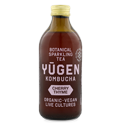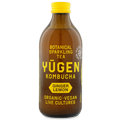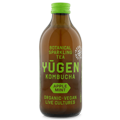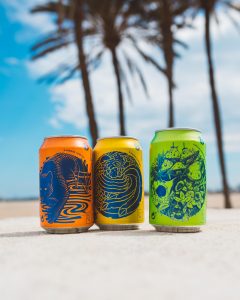
Jurgen Nobels is Belgian cocktail champion and FO (Famous Ostend citizen). When he stepped into our tasting bar last Friday to create some new Yugen cocktails, we took the opportunity to ask him some questions. The kombucha flowed freely, the fact that some spirits were mixed in only made the interview better. What follows is his personal story and his unfiltered vision of the craft cocktail revolution, the bar scene and the future of low cal drinks.

"Many people eat and drink but don't really taste."
Jurgen has worked in the hospitality industry from an early age. He was already cleaning mussel pots on the quay of Ostend when he was just fifteen. After high school he had enough and decided to focus on his studies. However, those studies were interrupted early on when the owner of Club Krush offered him two manager positions, one in the club and one in the owner's new brasserie.
“I had to make a choice, study or work, doing both was no longer an option. At that time I made a conscious choice for the hospitality industry, against the initial advice of my parents. I remember saying to myself "if I do this, I want to do it fucking good." At that moment I set the bar high for myself and defined clear goals.”
A decisive element in Jurgen's early career was the coffee machine in the brasserie Histoires d'O. Intrigued by the shiny device, Jurgen decided to take a barista course.
“It was the first time I really came into contact with flavours. Many people eat and drink but don’t really taste. Ask someone to blindly distinguish a grapefruit from an orange, most will fail. In the training we had to constantly smell small bottles and try to recognize them, not easy.”
Triggered by the new appreciation for aroma and taste, Jurgen decided to make the best mojito in Ostend. Other classics such as caipirinha and daiquiri soon followed. Back then, there was no official training to become a cocktail bartender so he went to Cadzand to work in Pure-C, the restaurant of Sergio Herman.
“At that time, we were in the midst of the Gin Tonic hype. Entire vegetable gardens and flower arrangements were incorporated into the cocktails. Thanks to Sergio Herman, many doors have opened. In 2014, I started working in Ghent in Uncle Babes, and in 2015, I registered for the Diageo World Class cocktail competition.”
Jurgen won the Belgian selection for this prestigious competition and thus earned a place in the world final in South Africa. He finished as a rookie in a nice 10th place and won the title "Fastest bartender in the world".
"Everyone who enters the bar must leave more happy"
After the competition, his career skyrocketed. Jurgen was asked to make cocktails in Ibiza and Cannes and to judge in other cocktail competitions.
“Making cocktails is easy. Being a good bartender is the challenge. After all, making cocktails is only one part of it. Taste, garnish, presentation, personal appearance, communication, organization and hygiene, these are all aspects on which we are judged.”
The most important thing, he says, is that everyone who enters the bar should go home more happy. A well-served cocktail can help. Jurgen no longer works permanently in bars. After so many years, the challenge is gone.
“I currently enjoy working on a project basis. I'm easily bored so I'm trying to turn this bad trait into something positive. That’s why I now mainly focus on consultancy, both for catering and for beverage companies. Every day is different and I enjoy that. I can offer my beer knowledge, cocktail knowledge and coffee knowledge. I help with designing new menus, thinking about concepts and shaping the look and feel of a business.”

“A shot for a shot”
His cocktail fascination is fueled by the important place alcohol holds in human history. Early references to the use of mind altering substances are found in almost all cultures.
“Pirates and rum is a classic example. To preserve the drinking water and to keep the crew under control, the water was diluted with rum during the long sea voyages. To prevent scurvy due to vitamin C deficiency, lime juice was added in the mix. Add some sugar to this and you have the forerunner of a true classic, the daiquiri.”
Jurgen spends a lot of time learning about the history and use of certain ingredients and drinks. Almost all of them have their own fascinating stories, which encourage him to do what he does.
“Sometimes I just can't stop reading. Did you know that the name "a shot" comes from a "bullet shot". Wild West cowboys traded bullets for a shot of bourbon in bars, apparently the two had the same value at the time.”
Label readers and low cal drinkers
Both the craft alcohol and the craft non-alcohol are currently booming. Although at first sight, both categories seem like water and fire, they mainly have similarities.
“In the 1960s and 70s there was a huge increase in the use of preservatives and additives. In the 90s people started to ask serious questions about the changing diet, especially when it turned out that obesity and diabetes was also on the rise. At that time there was a lot of uncertainty about what is good and bad. The counter reaction came in the 2000s. Initially mainly by health gurus, but nowadays everyone reads labels. People want to know what's in their food.”
Consumers today are more informed and choose more consciously. People understand that a healthy body starts with healthy food. Quality is more important than quantity. This is reflected, for example, in the increasing sales of organic products. Companies are responding to this and the supply of clean label products, made with high-quality ingredients, is increasing every day.
“The non-alcoholic market is currently growing strong, which I personally think is a good thing. Before, you could often only order sparkling water and cola in bars and restaurants. Now, you will find kombucha and other quality non alcohol and low alcohol alternatives. People drink more consciously, but this doesn’t mean that they no longer drink alcohol. Alcohol can be a fit with a healthy lifestyle, this is what they call healthy indulgence.”
The supply will only increase in the coming years. All trends show that non-alcohol, low-alcohol, low sugar and low calories are on the rise. Less is more has rarely been so appropriate.
“A mistake many young “craft” companies make is that they remain too small to be profitable. Craft must also be linked to volumes at some point. This creates challenges. In the case of kombucha, for example, it is much easier if you choose to pasteurize, or to use preservatives. I have a lot of respect for Yugen for not doing any of this. It shows that you’re not afraid of obstacles and stay true to authentic kombucha. I also understand other brands. Pasteurization is simply easier, more scalable. But for brand identity it seems better to not do it. It is an important part of your realness.”
Hard Kombucha
Hard kombucha, or kombucha with a higher alcohol content, is a new category that is currently growing rapidly in California, the cradle of commercial kombucha. The success of hard kombucha does not surprise Jurgen.
“What do you have around 5-6% alcohol except a pint? Not much. Cider, but that’s a limited market. Wine is around 12-14. Cocktails are even higher. People who want a healthy lunch with an aperitif do not have many options. The healthy properties of kombucha are still there, even if there is more alcohol.”
According to Jurgen, the target audience for hard kombucha are people who already have a healthier lifestyle. After all, people who want to drink alcohol more consciously don’t have many alternatives.
"Why are we going out? To have fun right? That’s often linked to drinking. That is not to say that people go totally crazy. But I still need to see a successful bar that only serves non alcoholic drinks. ”
Triple Gin, Slumdog and Mr Mojo
Jurgen is a friend of Yugen and also a fan from the start. During our very first taste test, long before the name “Yugen” was chosen, he already helped us as a taste expert.
Especially for Yugen, Jurgen has created five delicious cocktail versions of our flavours. In this type of work he finds it important to start from the philosophy of the existing product.
“I would never add things that would completely change the existing flavour or style. For example, it would be bizarre to add a lot of sugar or other junk to Yugen, that doesn't make sense. In the creative process it is important that I start from the taste and story of the brand. ”

The cocktails have since been extensively tested and approved at numerous events (We Can Dance, Kompass, Fernand, ...). The full flavour of the kombucha presents itself as a perfect base for making complex yet simple cocktails. It is actually often more difficult, or requires more creativity, to make something tasty with fewer ingredients. But the search pays off because the result is delicious.
“I still think Yugen is the best kombucha there is. Besides the healthy aspects, it’s just a super tasty drink. It ticks all the boxes for me, taste, good texture, refreshing, nice sparkle. Finding a combination with alcohol, such as bourbon with mango turmeric, was not so difficult, even though there is more to it than meets the eye.”
Cheers to that!
 I like Yugen Kombucha
I like Yugen Kombucha
 J'adore Yugen Kombucha
J'adore Yugen Kombucha






